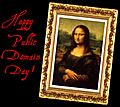Public domain facts for kids
Public domain describes things that belong to everyone. Think of it like a shared library where anyone can use the books, music, or art for free. These "works" (like books, movies, or paintings) are not protected by copyright.
The opposite of public domain is copyrighted material. This means someone owns the rights to that work. They decide how it can be used. Public domain only applies to things that could be copyrighted. This includes photos, drawings, articles, books, or plays. Over time, most creative works eventually become part of the public domain. Famous examples include the works of Leonardo da Vinci, William Shakespeare, and Ludwig van Beethoven. Even the books by Isaac Newton are now free for everyone to use.
Contents
What is Public Domain?
When something is in the public domain, it means there are no legal restrictions on its use. Anyone can copy it, share it, or even change it. You don't need to ask for permission or pay any fees. This is different from copyrighted works, which are owned by the creator or their family.
How Things Enter the Public Domain
A creative work can become public domain in several ways:
- The copyright simply runs out. This usually happens many years after the creator passes away. For example, it might be 50 or 70 years after their death.
- The creator might choose to give up their copyright. They legally say that anyone can use their work freely.
- In the past, creators sometimes forgot to renew their copyright. This was for works made before 1963.
- Some works are public domain from the start. This includes things made by certain government agencies.
- Works created by animals, like a photo taken by a monkey, are also in the public domain.
- Before 1989, if a copyright notice was missing details like the owner's name, year, or the copyright symbol, the work might have entered the public domain.
Important Things to Remember
Even if a work is in the public domain, there might still be some rules about how you can use it. For example:
- The design of national money is usually public domain. However, making fake money is a very serious crime.
- Some logos or images might only have text or simple shapes. These often aren't copyrighted. But they can still be protected by trademarks. A trademark stops others from using a brand's name or logo to sell their own products.
Images for kids
See also
 In Spanish: Dominio público para niños
In Spanish: Dominio público para niños
 | Sharif Bey |
 | Hale Woodruff |
 | Richmond Barthé |
 | Purvis Young |





